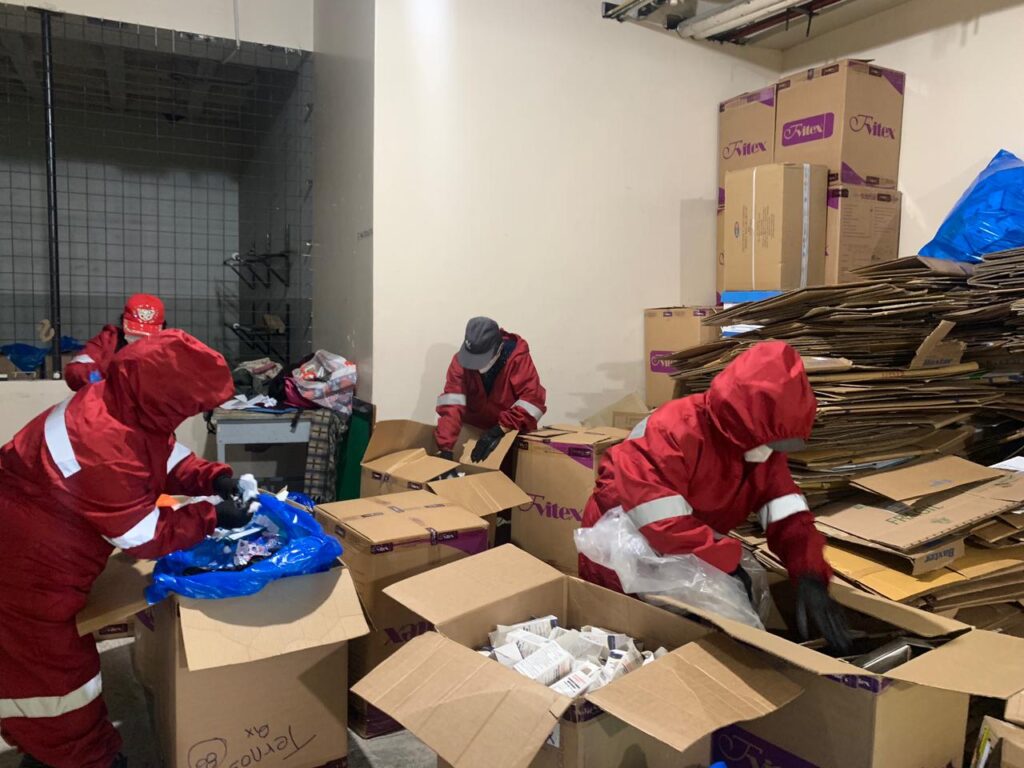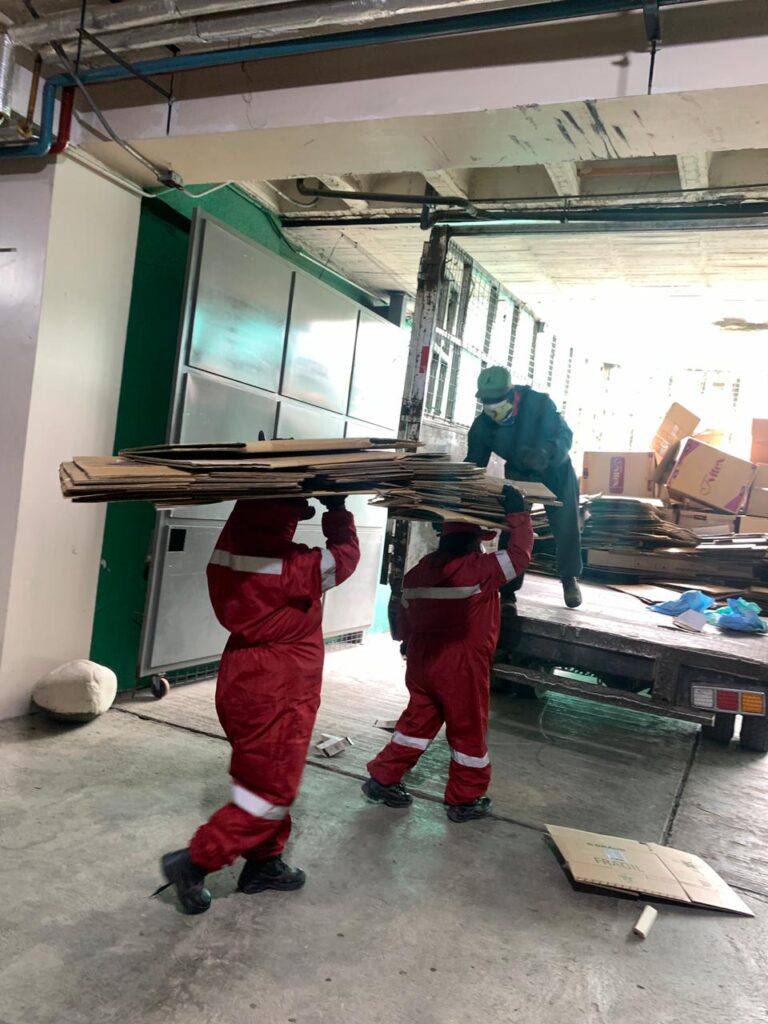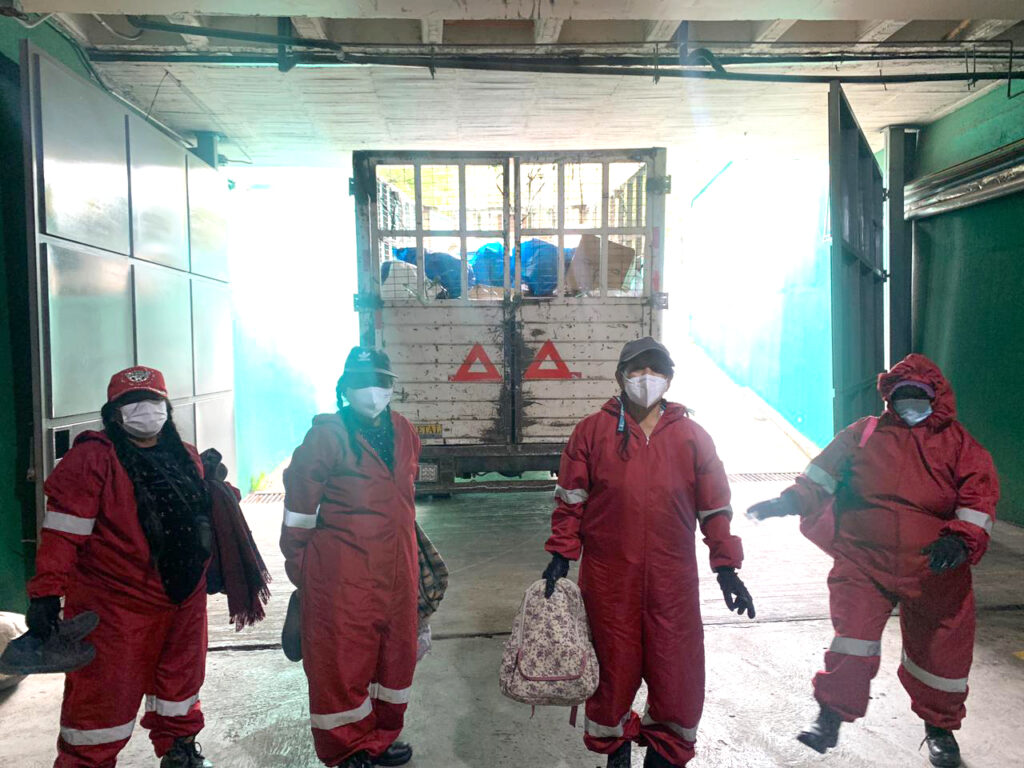Occupy Goes Global!
Cuenca
In 2020 OCC! expanded its scope and encouraged students to explore local initiatives in their city, resulting in entries from various locations. Here below you find the entries from Cuenca
Scroll for more
In 2020 OCC! expanded its scope and encouraged students to explore local initiatives in their city, resulting in entries from various locations. Here below you find the entries from Cuenca
Scroll for more
Katia Paola Barros Esquivel
Where is this grassroots initiative implemented? Who are the promoters? Who are the beneficiaries?
La Asociación de recicladoras de El Valle (AREV, Association of women recyclers of El Valle), is an association that have been operating since 1996. They are located in the El Valle parish, where the sanitary landfill of the city of Cuenca, Ecuador was located until 2001. AREV is made up of six members, all female, and most of them heads of household. It is part of a much larger network at the cantonal level. This network is made up of eleven associations as well as independent persons. In this context, recycling spaces are arranged so that most of the cantonal land is covered. AREV currently works in different locations in Cuenca, including El Valle parish. In the long term, this initiative aims to make the entire population of Cuenca and its peripheries aware of the benefits of these activities, in addition to educating the population to carry out this activity properly so that people begin to make a correct classification from the homes and make work easier for AREV.
How does this initiative engage with climate? Does it tackle mitigation, adaptation, both or other dimensions of climate change?
Annually, between 2.5 to 4 billion metric tons of waste are generated in the world, not counting those from construction, mining and agriculture (Delgado 2016). This is the result of the urban metabolism of cities, where urban spaces are open systems that take resources and energy outside the city system, from a geographical dimension, and discard dissipated energy and degraded materials (Delgado et al. 2016).
AREV’s initiative addresses both adaptation and mitigation to climate change. The adaptation is approached from the communication, awareness, and education measures of the waste management, since one of the fundamental tasks of AREV is to educate the families to recycle in a conscious way. The work of separating the types of waste is suitable for the new uses that can be given to the waste. In this context, AREV is constantly giving personalized talks to families who wish to integrate into a conscious way of recycling.
Similarly, in terms of mitigating climate change, this initiative contributes with actions of selective collection, composting and recycling of materials for their recovery and reuse. These actions allow the usual treatment of waste, collection – final disposal, change and give a new use to the waste.
In this context, the initiative allows the reduction of the energy consumption of solid waste treatment, if we compare it to the final energy flows of non-recycled waste with respect to the consumption of this treatment; in addition to the direct reduction of greenhouse gases by reducing the waste that is not deposited in the sanitary landfill, which would generate higher CH4 productions (Graziani 2018).

What are the main objectives? What are the main values?
AREV sets its main goals in consciously recycling solid waste, so that the selected materials serve a 100% new function. In this sense, the task has as one of its objectives to educate the population to be able to properly separate materials from those that cannot be recycled. In this way, AREV promotes that this activity becomes a habit for families and with it a fundamental and conscious part of acting so that even this environmental awareness is transmitted even without the need for the presence of AREV.
This organization currently has six members, and they try to ensure their actions allow them to recuperate a minimum of 1800 kilos of solid waste per month.
What is the timeline? Are there already visible effects?
In 1996, AREV started operations directly at the sanitary landfill, at that time, located in the “El Valle” parish, Cuenca; when the recyclers carried out their work directly in the space where solid waste was disposed of, salvaging materials such as cardboard, paper, plastics, and glass; in addition to organic waste for the manufacture of compost.
Once they were consolidated as associated waste pickers and in coordination with CARE (NGO that seeks social justice for the most vulnerable populations) they sought to form a network of waste pickers at the cantonal level. This project was started with two recyclers’ associations (one of them AREV) until now reaching eleven associations at the Cuenca canton level; this with the aim of covering the entire territory of the city. However, is this grassroots initiative, partner of AREV, their work was discriminated against by citizens and there was no regulation that endorses their work until the validity of the “Ordinance that regulates the integral management of waste and solid waste in the Cuenca canton” On April 1, 2003. As of this date, its actions have been boosted since citizens are obliged to store and dispose of waste differently in accordance with the principles of recycling.
The recyclers work is between two and four times a week. AREV recollect a minimum 300 kilos per month. In this way, the effects are not directly visible, since the recycled material is delivered to companies that can reuse it. However, it is pertinent to point out that the sanitary landfill of the city of Cuenca receives an average of 18,000 kilos less solid waste per month thanks to the work of the recyclers.

Who are the actors involved? What is their background?
AREV, being part of a comprehensive network of recyclers, covers the Cuenca canton for the most part. To consolidate this network, a coordinated action was established between various institutions. One of them was CARE, an NGO that promoted the collective action of the network at the cantonal level and its articulation with the national level. In addition, the local State through the Municipal Public Cleaning Company of Cuenca (EMAC EP), even though the recyclers do not have a dependency relationship with the EMAC, the company contributes to the training of waste pickers in general in medical matters, accounting, computing, crafts, and others.
In addition, according to Bertha Chalco, the EMAC grants the recyclers a kind of food voucher for their families and provides a nursery for those mothers who want to carry out this activity. Similarly, this network of recyclers at the cantonal level is articulated with a national network that provides implements and uniforms for recyclers.
Which limits (institutional, physical, social, etc.) does it encounter?
Because this is a local initiative, there are no institutional limitations. Regarding the physical limitations, it is important to highlight that the AREV requires a space where its recycling work is facilitated and where the recyclers can store their work implements.
Previously, AREV had a recycling plant located in the El Valle parish; However, now their task is carried out in different streets of the city of Cuenca, carrying out daily recycling tasks and sending the recycled material at the end of the day to intermediaries, who are in charge of selling these recycled materials to companies.

Are any shortcomings or critical points visible? What other problematic issues can arise from its implementation?
A visible critical point in the implementation of this initiative was going from recycling directly in a recycling plant, where they had a fixed space, to recycling directly on the streets passing house to house. As Bertha tells us, in this transition there was a time when recyclers had to store recyclable waste in their homes, in makeshift spaces, causing discomfort to their families and in a way to the neighborhood. That is why, currently, all recycled material is not stored in warehouses or in their homes but passes directly into the hands of intermediaries who are in charge of selling this recycled material to processing companies.
How would it be potentially replicable in other settings?
This initiative, being local, is easily replicable in other places, obviously it depends on the legal regulations that allow people to carry out recycling activities in cities. In addition, it is important to mention that AREV stands out because it expands its action space and provides training to companies and to households that want to recycle their solid waste, educating people to make a good separation of recyclable and non-recyclable waste. In this context, this initiative can even continue to expand in terms of the number of people who belong to the association and the number of households that want to be part of the people who take advantage of used materials or waste.
Is this initiative conducive to broader changes (law, institutional arrangements, long-term sustainability or community preparedness, etc.)? If yes, which?
The development of this initiative allows to show a form of social organization in network, not only of an association as such, but the way in which people can join the task of recycling and generate collective improvements and social responsibility with the environment.
Changing people’s non-recycling habit is a medium and long-term task, since first they must educate families to recollect materials that allow a new use and, on the other hand, this habit is maintained over time and do not be something temporary. Once the habits of the families have changed, Bertha mentions, it is easier for these habits to be shared even within the same family circle and the task of educating is no longer solely the task of the recyclers but becomes a part of essential education of each family.
References
Delgado, Gian Carlo. 2016. “Residuos sólidos municipales, minería urbana y cambio climático. El Cotidiano 195: 75-84.
Delgado, Gian Carlo, Cristina Campos y Patricia Tentería. 2016. “Cambio climático y el metabolismo urbano de las megaurbes latinoamericanas”. Hábitat Sustentable 2(1): 2-25.
Graziani, Pietro. 2018. Economía circular e innovación tecnológica en residuos sólidos: Oportunidades en América Latina. Buenos Aires: Corporación Andina de Fomento.